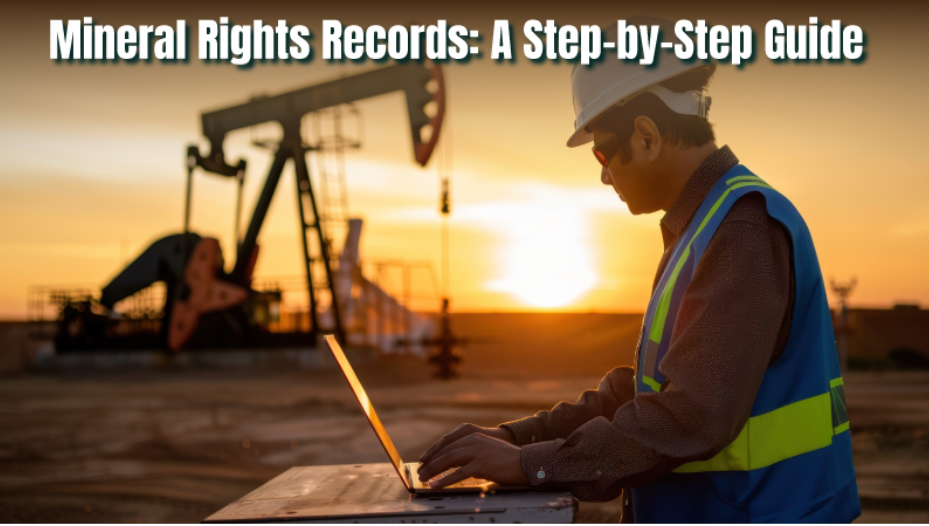If you are involved in the oil and gas industry, it is crucial to properly understand the mineral rights records. It is more important in states like Texas where oil and gas industries are at the forefront.
These records help you find the true ownership of mineral rights. You will easily find who possesses the rights to extract the minerals from the land and produce them with the help of such records. Whether you are a mineral owner or thinking of entering the oil and gas industry, knowing the mineral rights records assists you in making smarter decisions.
This comprehensive draft will help you understand every aspect of mineral rights records step by step. Let’s start with understanding what mineral rights records are.
What Are Mineral Rights Records?
The documents that contain all the information about the ownership of mineral land and who can extract the minerals like oil, natural gas, coal or metals are called mineral rights records. With the help of these records, one can find who can sell, lease or benefit from the minerals beneath the land.
They involve the details of the ownership chain, previous ownerships, amount of royalties, legal contracts and agreements and lease information. You will find these records at online platforms, county courthouses and state agencies. If you are planning to engage in mineral rights, checking the records is the essential step. This will also keep you away from legal disputes and wrong information.
Why Should We Search Mineral Rights Records?
Searching mineral rights records is the mandatory step if you are a fresher in the mineral industry. Here’s why you should search for mineral rights records.
Confirmation of Ownership
Generally, mineral rights are separate from surface rights, which means the person with surface rights can only utilize the land but not the minerals beneath it. Therefore, to get legal access to minerals, ownership confirmation is crucial.
Avoid Legal Disputes
If you engage in mineral rights without checking records, multiple parties may claim financial benefits from your rights and the ownership of the land, which may result in legal disputes. With proper searching of records, you can prevent such scenarios.
Protect Royalties, leases, Royalty Deeds
You must verify the mineral rights you own have no other party involved, as their involvement may split the benefits, affecting your royalties offered by oil and gas companies and lease and royalty deeds. To avoid these situations, searching mineral rights is obligatory.
Knowing the History of Property
Mineral rights are often passed from one owner to another. Searching for mineral rights records, you will get to know the past transfer of rights, agreements and lease details, helping you make smart decisions.
Prevent Scams and Fraud
Some companies or individuals may falsely claim ownership of mineral rights, making it essential to trace the ownership chain carefully. Verifying records protects you from fraudulent deals.
Ensure Proper Inheritance
If you inherit land, you may not automatically own the mineral rights. Checking records helps ensure rightful ownership transfers.
Assess Property Value
Knowing the extraction and mineral rights status affects land value. Land with active mineral rights can be more valuable than land without them.
By searching mineral rights records, landowners, investors, and companies can avoid problems, protect their assets, and make smart decisions. It’s a simple but crucial step in managing mineral rights effectively.
Where Can We Find Mineral Rights Records?
County Clerk’s Office
In Texas, property deeds like property titles and mineral rights, can be found at the county clerk’s office. Leases, royalty deeds, and other records pertaining to the ownership and transfer of mining rights are available here. The county clerk’s office is frequently the first place you look for information, whether you visit in person or use online databases. A title company can help further by confirming these records.
State Government Agencies
Records associated with mineral rights are also kept by state organizations, such as those in charge of overseeing public lands or controlling oil and gas operations. While oil and gas regulatory bodies manage leases and ownership in the energy sector, public land records include information about mineral rights on state-owned sites.
Title Companies
When searching for mineral rights documents, title companies can be helpful friends because they specialize in property ownership research and can ensure correct information by carefully examining property titles to trace the ownership chain. These businesses can speed up your search by employing extraction techniques to deliver useful information about ownership structures because they have access to large databases and are skilled in title searches.
Common Problems When Searching Mineral Rights Records
Limited Online Access
Mineral rights data can be hard to find online in some places. Online records might not be available in certain counties or may only show part of the information. You may need to go to the county office if you can’t find what you need online. Also, you can ask local offices for certain pages by email or mail.
Complicated Ownership Structures
Figuring out who owns mineral rights is not always easy. When more than one person or business owns part of the rights, it can be hard to know who owns what. It’s best to get help from experts, like lawyers or title companies, in these cases. They can look at the papers and explain who owns what.
Incomplete or Outdated Records
Records for mineral rights might not always be right or complete. Some papers could be missing, or ownership might have changed without being updated. Always double-check the facts by looking at several sources and doing a full search to avoid mistakes.
Final Words
People who work in or invest in oil and gas need to understand mineral rights records, especially in places like Texas, where there are many of them. These papers help make sure ownership is correct, which is important for things like leases, royalties, and legal issues.
Knowing where to look, such as county offices, state offices, or title companies, can make the search easier, even though it can still be hard sometimes because of blocked access or complicated records. A simple way to look up ownership details and mineral land is by using tools like Mineral View or title company services.
You may protect your interests, avoid costly mistakes, and make better choices on mineral rights by taking the time to look at these records. You can save time and effort by using well-organized digital records on different websites.





